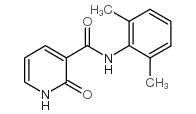57021-61-1
| Name | isonixin |
|---|---|
| Synonyms |
Nixyn hermes
N-(2,6-Dimethylphenyl)-1,2-dihydro-2-oxo-3-pyridinecarboxamide Nixyn 1,2-Dihydro-2-oxo-N-(2,6-xylyl)-3-pyridinecarboxamide Isonixine |
| Description | Isonixin (Isonixine) is a non-steroidal compound. Isonixin can be used for the research of pain and inflammation[1][2][3][4]. |
|---|---|
| Related Catalog | |
| In Vivo | Isonixine potentiates hexobarbital sleep time, reduces motor activity, antagonizes cardiazol-induced convulsions, causes hyperthermia, and inhibits tremorine-induced trembling in mice[1]. Isonixine (p.o.) showes a 3.15 h half-life of absorption and rapidly absorbs in a gastro-intestinal tract[2]. Isonixine (i.v., intragastrically and intraduodenally) mainly excrets via urine, and isonixine can be eliminated by urine within 50 hours[3]. Isonixine (2000 mg/kg; p.o. once daily for 6 months) presents some mild toxic effects and induces no gastrointestinal lesion in male rabbits and rats[4]. |
| Density | 1.244g/cm3 |
|---|---|
| Boiling Point | 520.5ºC at 760 mmHg |
| Molecular Formula | C14H14N2O2 |
| Molecular Weight | 242.27300 |
| Flash Point | 217.5ºC |
| Exact Mass | 242.10600 |
| PSA | 61.96000 |
| LogP | 2.31700 |
| Index of Refraction | 1.628 |
CHEMICAL IDENTIFICATION
HEALTH HAZARD DATAACUTE TOXICITY DATA
|
